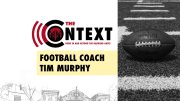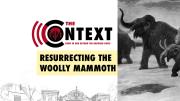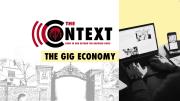This is the eleventh post of "The Context"—a biweekly series of archival stories—offering our readers a useful background to some of the most important (and fun!) subjects in the news today. We hope you enjoy it.
With a dominant victory last weekend against Brown, Crimson football coach Tim Murphy became the winningest coach in Ivy League history. His 180th win, achieved in his twenty-eighth year at Harvard, put him ahead of Carmen Cozza, who led Yale between 1965 and ’96.
But while Coach Murphy is known for his on-field success, a recent Boston Globe article highlights another of Murphy’s prominent roles: a life coach for his players. The article points to some former athletes who credit him for leading them toward a life of success and purpose they hadn’t seen for themselves. “He knew how much I needed guidance. He knew how powerful a degree was. And he helped me see it,” said Isaiah Kacyvenski ’00, M.B.A. ’11, who grew up in poverty and lost his mother shortly before Murphy came to his house on a recruiting trip. “He opened up this world that felt, in a lot of different ways, not accessible, not reachable to someone like myself—and a bunch of guys that played for him as well.”
After his career at Harvard, Kacyvenski spent eight years in the NFL and earned a business degree. He now leads the venture capital fund Will Ventures. He’s one of several players with a similar story to share about Murphy.
The article reminded me of a great profile of Murphy that Harvard Magazine contributing editor Dick Friedman wrote in 2015. In the feature, Friedman declares Murphy “Harvard’s greatest football coach”—no small feat for a program in its 147th season. He traces Murphy’s path back to his childhood, describing the experiences that turned him into the hard-nosed, resourceful coach he has become.
It’s fun to read about how Murphy, shortly after his thirtieth birthday, considered going to business school after getting accepted to two top programs, but accepted an offer for a head coaching job instead. “I asked [Northwestern’s Kellogg School of Management] to defer me for a year and I’ll get this head coaching thing out of my system,” he told Friedman, “Twenty-eight years later, I still haven’t."
The article is titled “Murphy Time,” the phrase players use to describe their coach’s tendency for running five or ten minutes early. Much more than a timing quirk, it’s shorthand for the level of dedication and seriousness that Murphy expects from his players. Said Kyle Juszczyk ’13, now a fullback on the San Francisco 49ers, “I still run on Murphy time.”
If you’d like to read about some of Coach Murphy’s greatest athletes (and others who pre-date his arrival), I recommend any of the articles in Friedman’s “Great Performances” series. During a season canceled by the COVID-19 pandemic, he wrote several dispatches on the best football players and performances in Harvard’s history. This article on The Game of 2014 and a legendary performance by Andrew Fisher ’16 is one highlight. (The other nine stories are linked at the bottom of that piece.)
And for a look into the culture of Ivy League sports during Murphy’s time at Harvard, I recommend “The Professionalization of Ivy League Sports,” a sweeping look into how the stakes of recruiting, training, and competition have increased during the past few decades. The drastic changes make Murphy’s consistency all the more impressive.
More from “The Context”
- Resurrecting the Woolly Mammoth: Our latest work on the potential of synthetic biology
- How the United States Can Cut Greenhouse-Gas Emissions: Our best articles on climate-change solutions
- The Gig Economy and the Future of Work: Our best work on employment's present and future
- Affirmative Action and Harvard: Recent and archival work on litigation in admissions
- Life on the Mesopotamian Marshes—and the Specter of Drought: Past work on water and human intervention
- How Exercise Gives Us Purpose: Reviewing our best articles on exercise
- Arthur C. Brooks on "Revenge Bedtime Procrastiination": Presenting our best archival work on sleep
- Universities Pushed to Reckon with Slavery: Students and activists advocate for institutional change.
- Simpsons Writer John Swartzwelder on Comedy: Sharing some of our best work on comedians and their craft
- Daniel Lieberman on Food Addiction: Framing the news with our best articles on diet and health









